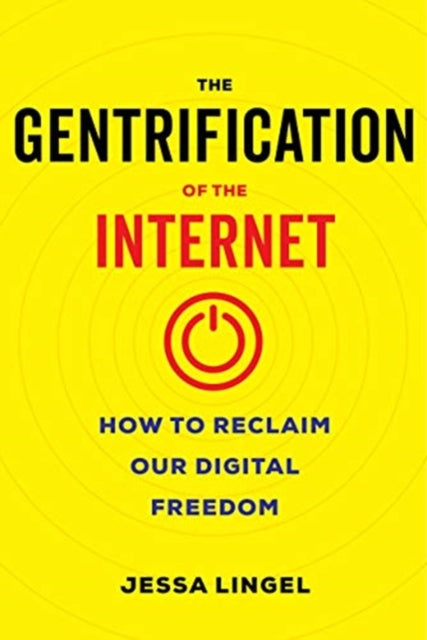Jessa Lingel
Gentrification of the Internet: How to Reclaim Our Digital Freedom
Gentrification of the Internet: How to Reclaim Our Digital Freedom
YOU SAVE £3.25
- Condition: Brand new
- UK Delivery times: Usually arrives within 2 - 3 working days
- UK Shipping: Fee starts at £2.39. Subject to product weight & dimension
Bulk ordering. Want 15 or more copies? Get a personalised quote and bigger discounts. Learn more about bulk orders.
Couldn't load pickup availability
- More about Gentrification of the Internet: How to Reclaim Our Digital Freedom
The internet has become commercial, isolating, and full of bias, leading to gentrification. Jessa Lingel argues that we can reclaim the early internet's possibilities by taking steps to defend and secure more protections for the individual and to carve out more spaces of freedom for the people online.
Format: Hardback
Length: 168 pages
Publication date: 18 May 2021
Publisher: University of California Press
The internet has evolved into a contentious realm, surpassing initial expectations and becoming a commercialized, isolated, and biased platform. This transformation was not predetermined and can be attributed to the gentrification of the internet, where the interests of business and capital have overshadowed those of its users. In her book, The Gentrification of the Internet, Jessa Lingel highlights the significant issues plaguing our contemporary internet, including privacy erosion, the demise of small businesses, and the prevalence of paywalls. However, there remains hope for reclaiming the early internet's potential. Lingel proposes actionable steps for internet activists and everyday users to advocate for individual rights and create spaces of freedom online, challenging the dominance of businesses.
The internet has witnessed a remarkable transformation over the years, evolving from a platform for information sharing and collaboration to a highly commercialized and polarized space. This shift has been driven by a multitude of factors, including the rise of big tech companies, the proliferation of social media, and the changing attitudes of users towards online privacy and security.
One of the most significant consequences of the gentrification of the internet has been the erosion of individual ownership and control. Large tech companies have amassed vast amounts of data and influence, often at the expense of users' privacy and personal information. This has led to concerns about the concentration of power in the hands of a few companies and the potential for abuse of this power.
Another issue arising from the gentrification of the internet is the dominance of large corporations over small businesses. The rise of e-commerce and the ease of setting up online stores have made it easier for large companies to compete with small businesses, often leading to the closure of local shops and the displacement of workers. This has had a significant impact on the economy and the diversity of local communities.
The prevalence of paywalls and subscription-based models has also contributed to the gentrification of the internet. Many websites and online services now require users to pay a monthly fee or subscribe to access content, which can be prohibitive for some individuals and families. This has led to a bifurcation of the internet, with a limited number of privileged users who can afford to access premium content and a larger number of marginalized users who are left behind.
Despite these challenges, there are still steps that internet activists and everyday users can take to reclaim the heady possibilities of the early internet. One approach is to advocate for stronger regulations and policies that protect the privacy and rights of users. This includes measures such as data protection laws, anti-discrimination laws, and regulations that prevent the concentration of power in the hands of a few companies.
Another approach is to promote the use of open-source software and platforms that are accessible to all users, regardless of their financial means. This includes initiatives such as the Linux operating system, open-source web browsers, and open-source databases. By promoting the use of these tools, we can create a more decentralized and democratic internet that is not controlled by a few large corporations.
Furthermore, internet users can also take steps to protect their own privacy and security online. This includes using strong passwords, enabling two-factor authentication, and being cautious of online scams and phishing attempts. By taking these steps, we can reduce the risk of our personal information being compromised and protect ourselves from the potential harm caused by cybercriminals.
In conclusion, the gentrification of the internet has brought about significant challenges and concerns. However, by advocating for stronger regulations, promoting open-source software, and taking steps to protect our privacy and security, we can reclaim the heady possibilities of the early internet and create a more decentralized and democratic online ecosystem.
Weight: 336g
Dimension: 147 x 218 x 20 (mm)
ISBN-13: 9780520344907
This item can be found in:
UK and International shipping information
UK and International shipping information
UK Delivery and returns information:
- Delivery within 2 - 3 days when ordering in the UK.
- Shipping fee for UK customers from £2.39. Fully tracked shipping service available.
- Returns policy: Return within 30 days of receipt for full refund.
International deliveries:
Shulph Ink now ships to Australia, Belgium, Canada, France, Germany, Ireland, Italy, India, Luxembourg Saudi Arabia, Singapore, Spain, Netherlands, New Zealand, United Arab Emirates, United States of America.
- Delivery times: within 5 - 10 days for international orders.
- Shipping fee: charges vary for overseas orders. Only tracked services are available for most international orders. Some countries have untracked shipping options.
- Customs charges: If ordering to addresses outside the United Kingdom, you may or may not incur additional customs and duties fees during local delivery.


